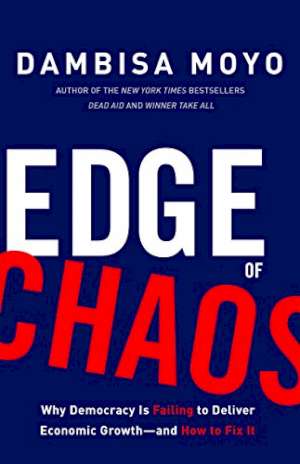09 July 2018
Edge of Chaos
Why Democracy Is Failing to Deliver Economic Growth‑and How to Fix It
Dambisa Moyo
2018, Little, Brown Book Group, 228 pages,
ISBN 9781408710890
Reviewer: Rosemary Connell

The author argues that western-style democracy cannot deliver the economic growth wanted by voters and proposes ten reforms to democracy to remedy this. Politics not economics is deemed to be the main driver of prosperity. When economic growth wanes people suffer and government’s ability to fund public goods is diminished.
Interesting selected histories of economic growth/decline for a number of countries are outlined. For instance, we are reminded of China being transformed from one of the richest economies in the 19th century to one of the poorest in the 1950 before regenerating to become the powerhouse it is today. History has shown that there is a correlation between economic growth and the strength of a country’s institutions. China is one example of this.
Capitalism is constrained by scarce natural resources and high unsustainable debts. Demographics can be another negative influence, as is increasing income inequality. Technological progress can have positive effects but these may be outweighed by negative ones.
Globalisation and global trade have been major sources of economic growth, but protectionism threatens and disaffection with globalisation is evident in some countries.
The author illustrates the challenges to democracy in a number of countries and describes why this is so with extensive examples.
Government effectiveness is key but the size of governments is tending to increase whereas it is the private sector that is the engine of growth. Government intervention tends to promote short-term thinking by both governments and business, and this can be detrimental to long term economic growth. Short-termism leads to under-investment in infrastructure and the pressure of quarterly reporting may lead to reduced spending by businesses on capital investment and research.
The author proposes ten radical reforms to revive the quality of political decision-making in mature democracies and bring us back from the edge of chaos. Many of these are very controversial.
The appendix shows that none of the democracies score well on the list of the ten proposed reforms to date. Implementing them will be a major challenge, but if nothing is done the author warns that the result will be chaos.
This is a well-researched, well-written and thought-provoking book which must appeal to a wide readership. The historical illustrations are informative and the proposed reforms should evoke heated discussion.
